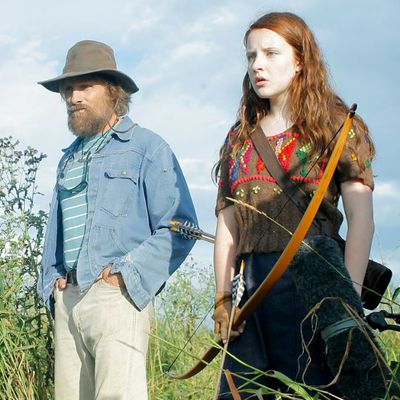
In the admirably anarchistic family saga Captain Fantastic, a father named Ben (Viggo Mortensen) makes a valiant stab at keeping his six children out of the clutches of our corporate-capitalist oligarchy and the mindless consumerism it promulgates. That’s why Ben and his wife have moved their brood to the forests of the Pacific Northwest, where the kids are trained in survival techniques (self-defense, weaponry, hunting with bows and knives, cutting out the heart of a slaughtered deer and eating it raw) and schooled in the evils of American civilization. They’re a smart, tough, attractive bunch — and the best little atheists you could hope to meet. The birthday they celebrate isn’t Jesus’s but Noam Chomsky’s.
You could actually think of the movie as Noam Chomsky’s Little Miss Sunshine. It has a wacky road trip, a gonzo public disruption, a stolen corpse, some tears, and a lot of rage against the capitalist machine. It made me wish I’d taken my kids on more hunts. Or one hunt. Or an overnight hike, even. Or at least kept them away from computer screens, iPhones, and Instagram. It turns out you can pass the time very nicely with a guitar and a collection of Woody Guthrie songs.
The dramatic linchpin of Captain Fantastic is the loss of the kids’ mother, who leaves them for a psychiatric hospital (she’s bipolar) and, three months later, takes her life. (This isn’t really a spoiler — it’s in the first act and is the springboard for everything else.) Her wealthy, straight-laced father (Frank Langella) blames Ben and forbids the family to attend the funeral — an interdiction that Ben considers, to his grieving kids’ dismay. Then, with a cry of “Fuck that!” the clan rumbles off in their bus for points south, past strip malls and chain stores and other specimens of capitalist decadence. They visit a campground where the oldest son, Bo (George MacKay), has his first encounter with a sexy teenage girl and proposes marriage. A stop at the home of Ben’s sister-in-law (Kathryn Hahn) and her husband (Steve Zahn) introduces the kids to their teenage cousins, who seem like products of their culture, un-free thinkers. The family also stops to shoplift their meals on the premise that they’re striking a blow against the Man.
How you take all this will depend, of course, on your politics, your philosophy of child-rearing, and your degree of disgust with civilization.
How, for example, will you feel when the children scale a vertical cliff and one of the boys slips and falls, hurts his hand, and dangles from a rope while Ben watches, passively, waiting for his son to haul himself up — or not? Do you trust Ben to educate his children by himself, without the say of any government entity? (And if you lean left, what would you think if he were teaching them that evolution is an unsubstantiated theory and global warming a hoax?) And what about those schemes (Ben pretends to have a heart attack while his children pilfer goods) to feed themselves for free on the road?
The writer-director, Matt Ross (best known as an actor on Big Love, American Horror Story, and Silicon Valley), is a tad ham-handed in how he lays out the dialectics, but he has the decency to undermine his righteous protagonist. The questions hang: How little corporate-capitalist civilization is too little corporate-capitalist civilization? Isn’t socialization a vital part of growing up? Would it be better to compromise a bit for the sake of children’s safety? I’ll let you grapple with these issues yourself over drinks or perhaps a long hike. The movie’s most howlingly effective scene, though, dramatizes the double standard at the heart of our God-friendly culture: A cop stops the bus and wonders why these kids aren’t in school — whereupon one of them begins extolling Jesus and inviting the cop to join them in celebration of their savior. He mumbles something, backs away, and lets them go. Fundamentalists get a pass.
Ross is an exuberant filmmaker — he pulls you into this family’s world. And the kids are wonderful, all of them: fierce redheads, but wide-eyed and watchful. (The honor roll, in addition to MacKay: Samantha Isler, Annalise Basso, Nicholas Hamilton, Shree Crooks, and Charlie Shotwell.) As a dad who has recently driven past splendid mountains and coastlines while his children were busy collecting Japanese whateverthefucktheyare from the ether on their goddamn phones, I was impressed. They’re not Chomsky automatons, either. One son can’t get over the loss of his mom. He blames his father for what happened to her, not entirely unjustly. Mortensen nails the problem with Ben, buff and committed as he is: He’s inflexible. And the military model is all too conducive to the kind of fascism he supposedly opposes.
As the father-in-law, Langella has one of those thankless antagonist roles — the rigid, killjoy patriarch — that older actors take for the paycheck and almost never pull off. As usual these days, he’s remarkable. He has so much dramatic weight that you come close to believing he knows what’s right for these kids. You can imagine them living with him and his wife (Ann Dowd) and not being happy, exactly, but also not suffering mortal wounds from falling off cliffs. For parents, alive is better than dead. As for how you keep their minds alive — that, indeed, is the question.


